 |

 Day 7
|

|
 Germany Germany
In Germany, the three Thursdays before Christmas were traditionally known as Knocking Nights.
What did children do on those nights?
 Answer Answer
|

|
They wore masks and made lots of noise!
On a Knocking night or klopfelnachten(another name for this special night) children wore masks and went from house to house banging lids and clanging cowbells in their neighbourhood.
(This tradition is not carried out today) |
Frohe Weihnachten und alles Gute im Neuen Jahr
(Happy Christmas and best wishes for the New Year)
 ‘Fröhliche Weihnachten’ is Merry Christmas in German. ‘Fröhliche Weihnachten’ is Merry Christmas in German.
 Father Christmas is known as St Nicholas or ‘Der Weihnachtsmann’. Father Christmas is known as St Nicholas or ‘Der Weihnachtsmann’.
 |
December 6 is Nikolaustag, or St. Nicholas’ Day. St Nicholas Day is a traditional gift-giving day in many countries in Europe. |
 |
On St Nicholas eve, children put their – freshly polished – boots (called Nikolaus-stiefel )
by the door or on the windowsill for St. Nicholas to fill with presents. Sometimes he comes to visit in person, wearing a long robe and carrying a tall, curved staff. If they have been good, the children receive sweets or chocolate. If they have been bad they receive slaps from St Nicholas companion, called “Knecht Ruprecht”. |
 |
Germany is famous for
its Christmas Markets.
Early in December, the oldest and most famous market, Nuremberg’s Christkindlesmarkt (Christ Child Market) is opened. The stalls have red and white
striped roofs and sell Christmas decoration, food, toys, and
presents. |
Photographs showing the Christmas Market in Munich
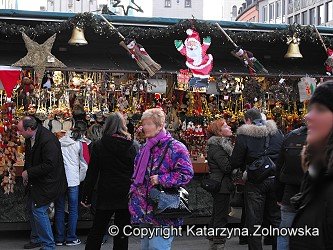 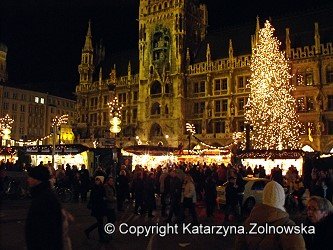
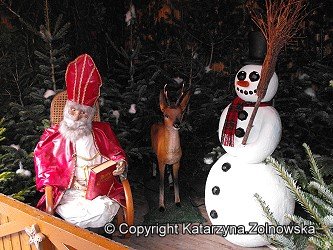 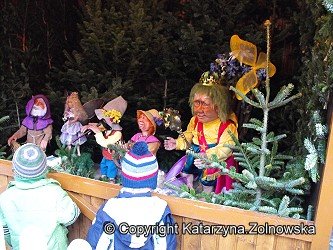
 |
The advent wreath is an essential part of a German Christmas. Every home has an Advent Wreath (“Adventskranz”). Schools also hang advent wreathes in classrooms. |
Monika, from Germany, told us:
‘At school we light the advent candles every morning, sing Christmas carols together and open another door or gift at the advent calendar‘. |
 |
People in Germany bake special biscuits (cookies) around Christmas time
|
Myriam, from Germany, told us:
‘I originally come from the area around Stuttgart in the south of Germany and we have a very special cookie called Springerle. It is a simple recipe – 4 eggs, 500g flour, 500g icing sugar and a drop of Schnaps + aniseed. The thing making those cookies so interesting are the molds used to create the patterns on them.‘ |
For over a thousand years, hand-carved molds have been used to imprint "picture cookies." The photographs below were sent to us by Myrian. The first two photographs show the raw "picture cookies" (Springerle) just out of the mold.
The raw Springerle are left for twenty-four hours to dry before baking. This helps to retain the details of the pictures.

Round Springerle biscuits
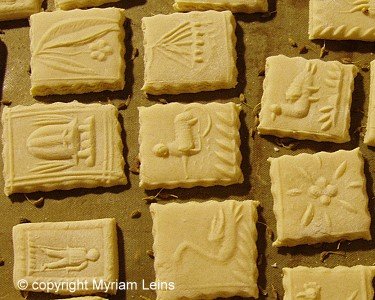
Rectangle Springerle biscuits
In the oven the Springerle biscuits rise. It is thought that the name "springerle" may have come about because the cookies rise or "spring up" while cooking.
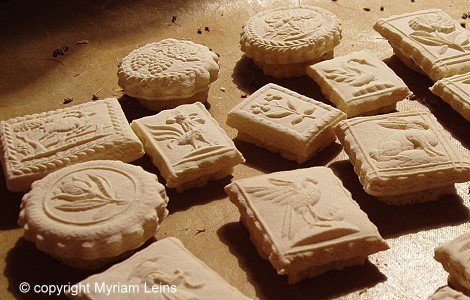
The Springerle have risen.
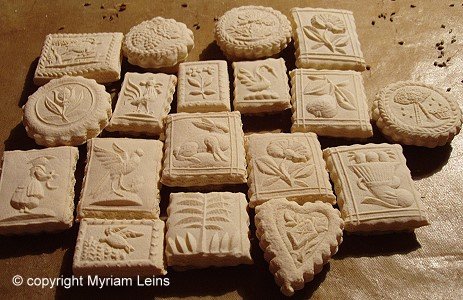
 |
Traditional
German Christmas decorations are prune men or prune women ( Quetschenmännchen ) and straw stars.
The Prune
people are about 25cm tall. Their arms and legs are made out
of prunes and their bodies are made of dried figs. Walnuts are
used for the heads and faces are painted on. Clothes are made
for the prune people too. The Germans say "You will never
be without gold and happiness, if you have a prune person in
your house." |
 |
December 21st,
in Germany is known as St. Thomas Day. In some areas of Germany,
whoever wakes up late or arrives late to work on that day is
issued the title "Thomas Donkey." They are given a
cardboard donkey and people make jokes about them. |
 |
Children in Germany write letters to the Christ Child, like we write
letters to Father Christmas. They send the letters either by post or leave them on the windowsill for the Child Christ to collect. |
 |
Children open their Christmas presents on Heiligabend (Christmas Eve). On that day, while the children wait in another room, Father Christmas or the Christ Child (Christkind), as he is known in southern Germany, leaves presents
under the Christmas tree (Tannenbaum) and lights the candles on it, ringing a
bell to announce the arrival of Christmas. Everyone gathers to open presents,
play music and sing carols. |
 |
For Christmas
Dinner, Germans eat Christmas goose (Weihnachtsgans) with potato
balls (dumplings) and red cabbage. |
A childhood memory …….
"A
popular game we played in Germany was with a bag full of walnuts, one of the nuts was painted gold. Children took turns to close their eyes and pick out a walnut. The child who got the gold walnut won a star or an prize." Vicky Raistrick |
18 days until Christmas!
Father Christmas, I am being very good today.
I wonder how reindeers can fly?
I am going to e-mail Father Christmas right now and ask him.
I will tell you what he says tomorrow.
Find out more about the country of Germany

Advent Calendar
|
|
|
|

 
© Copyright 2013
 © Copyright – please read © Copyright – please read
All the materials on these pages are free for homework and classroom use only. You may not redistribute, sell or place the content of this page on any other website or blog without written permission from the . |
is the creator of the Woodlands Resources section of the Woodlands Junior website.
The two websites projectbritain.com and primaryhomeworkhelp.co.uk are the new homes for the Woodlands Resources.
left Woodlands in 2003 to work in Kent schools as an ICT Consulatant.
She now teaches computers at The Granville School and St. John’s Primary School in Sevenoaks Kent.
Follow on Twitter
Woodlands Homework Help new website
customs traditions britain, scotland customs and traditions, traditional british christmas dinner, christmas customs traditions, christmas traditions, british culture customs traditions, british christmas customs, british christmas carols, british christmas crackers, british christmas pudding,british christmas trees, british christmas dinner, british celebrate christmas, british royal family, chrsitmas traditions, christmas customs, england, wales, scotland, Christmas Celebrations, british traditions, british customs, british culture, December, Christmas, food, christmas dinner, mince pies, advent, christmas eve, christmas day, boxing day, 12 days of christmas, new year, christmas pudding, christmas cake, christmas carols, christmas cards, christmas stocking, pantomime, santa claus, st nicholas, christmas presents, christmas crackers, christmas trees, mistletoe, holly, ivy
|
|
 © Copyright – please read
© Copyright – please read 











